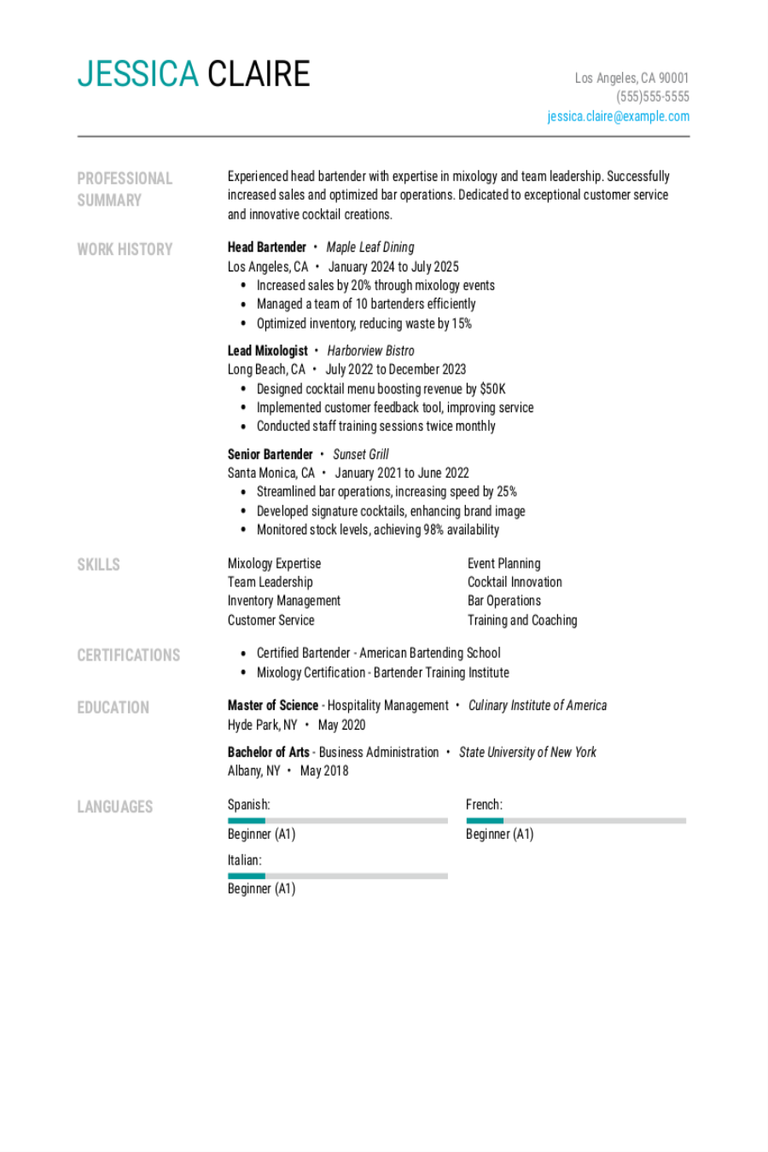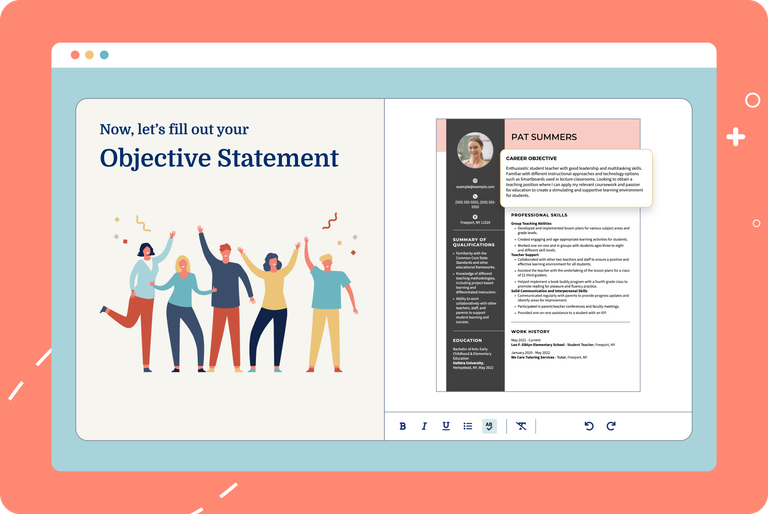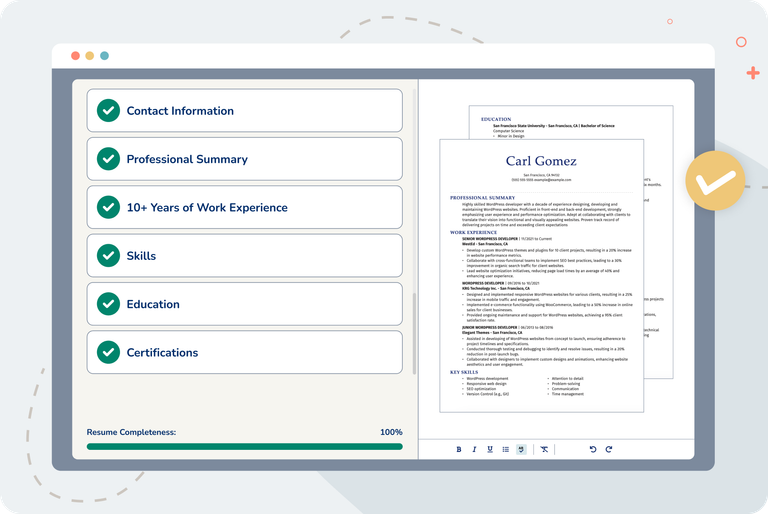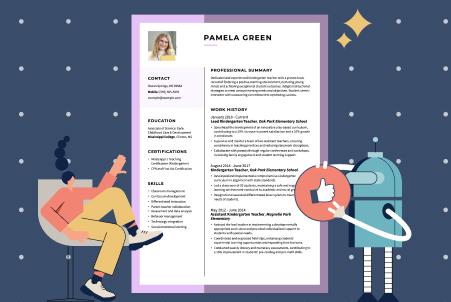Table of Contents
Get started with MyPerfectResume today!
- Build a resume on any device
- Pick an ATS-friendly template
- Tailor with AI copy suggestions
Why this resume works
- Quantifies accomplishments: By increasing cocktail sales by 25% and maintaining a 98% customer satisfaction rating, the applicant’s measurable accomplishments prove their ability to drive growth and optimize service.
- Highlights industry-specific skills: The inclusion of skills like menu engineering, upselling techniques, and regulatory compliance demonstrates their mastery of hospitality-specific expertise tailored for bar management roles.
- Uses action-oriented language: Action verbs like revamped, streamlined, and trained emphasize proactive contributions, clearly portraying a hands-on approach to problem-solving and team development.
More Bartender Resume Examples
Explore more resume examples to learn how to effectively showcase your mixology skills and hospitality experience. These samples offer guidance on crafting a resume that highlights your service expertise and customer engagement.
Entry-Level Bartender
Why this resume works
- Effective use of keywords: Strategically weaving in role-specific keywords like inventory management and team leadership, the applicant’s resume is tailored to pass filters with ease.
- Puts skills at the forefront: By placing skills such as customer service excellence prominently, the layout aligns with a skills-based resume format that’s ideal for showcasing strengths early in your career.
- Shows digital literacy: Leveraging new bar technologies and POS systems operation, the resume reflects strong computer skills essential in virtually all modern hospitality environments.
Mid-Level Bartender
Why this resume works
- Points to measurable outcomes: By quantifying results like a 20% increase in weekly sales and a 30% boost in customer satisfaction, the applicant emphasizes their ability to deliver impactful outcomes in hospitality roles.
- Displays technical expertise: Specialized skills such as menu design, inventory management, and POS systems showcase advanced technical knowledge integral to streamlining operations and improving customer experiences.
- Demonstrates language abilities: Language skills in Spanish, French, and Italian suggests the applicant would succeed in a cross-cultural environment, due to smoother communication with a diverse set of patrons.
Experienced Bartender
Why this resume works
- Focuses on work history: Using a chronological resume, the applicant’s extensive work history is displayed clearly, highlighting career progression from bar associate to specialist to bartender.
- Lists key certifications: Listing relevant certifications like Certified Mixologist and Responsible Beverage Service Certification adds credibility to their bartending skills and dedication to professional growth.
- Showcases impressive accomplishments: Standout accomplishments such as increasing sales by 25% and winning first place in a cocktail competition reflect senior-level performance and significant business impact.
Bartender Resume Template (Text Version)
David Jones
New York, NY 10003
(555)555-5555
David.Jones@example.com
Professional Summary
Experienced bartender skilled in cocktail crafting and customer service. Proven track record of increasing sales and streamlining operations. Fluent in Spanish with expertise in inventory management and menu engineering.
Skills
- Cocktail Crafting
- Inventory Management
- Customer Service
- Menu Engineering
- Point-of-Sale Systems
- Team Leadership
- Upselling Techniques
- Regulatory Compliance
Certifications
- Advanced Mixology Certification – American Bartending School
- Food Handler’s Certification – National Restaurant Association
Education
Bachelor’s Hospitality Management
University of Oregon Eugene, Oregon
May 2015
High School Diploma
Portland High School Portland, Oregon
June 2011
Work History
Bartender
The Urban Fork – New York, NY
May 2022 – May 2025
- Increased cocktail sales by 25% via menu optimization.
- Trained 5 new hires on cocktail preparation and customer service.
- Maintained a 98% customer satisfaction rating for bar services.
Mixologist
Maple Leaf Dining – Brooklyn, NY
June 2018 – April 2022
- Designed 12 seasonal cocktails that boosted sales by 20%.
- Improved inventory accuracy by 30% through precise tracking.
- Collaborated with chefs to pair beverages with menu items.
Bar Utility Specialist
Harborview Bistro – Newark, NJ
May 2015 – June 2018
- Reduced customer wait times by 15% via efficient bar setup.
- Raised monthly profit by ,000 through upselling strategies.
- Ensured compliance with local alcohol serving regulations.
Languages
- Spanish – Beginner (A1)
- French – Intermediate (B1)
- Italian – Beginner (A1)
Related Resume Guides
Advice for Writing Your Bartender Resume
Dive into our tips on how to write a resume for a bartender position and discover strategies for highlighting your mixology skills, customer service experience, and unique flair behind the bar.
Whether you’re shaking up cocktails or serving regulars with a smile, we’ll help you craft a resume that stands out in the hospitality scene.
Write a strong professional summary
When crafting your resume introduction, you’ll need to choose whether a professional summary or an resume objective is the best fit for you.
A professional summary usually consists of 3-4 sentences and highlights your experience, skills, and achievements. It’s ideal for those with solid work histories. Its purpose is to showcase your professional identity and the value you offer.
In contrast, resume objectives are statements of career goals. They’re more suited for entry-level workers, career changers, or individuals with employment gaps. Think of it as “what I’ve accomplished” versus “what I aim to contribute.”
Now that we understand both options, we will provide examples of summaries and objectives tailored to various industries and experience levels, all specifically for bartenders.
Bartender resume summary examples
Entry-level
Recent hospitality management graduate with bartending certification and hands-on training in beverage preparation and customer service. Skilled in cocktail mixing, drink garnishing, and handling point-of-sale systems. Eager to contribute to a dynamic team by creating memorable experiences for guests while maintaining a clean and organized bar environment.
Mid-career
Experienced bartender with 5+ years of expertise in high-volume settings, specializing in crafting signature cocktails and managing inventory. Adept at engaging with customers to improve their dining experience while ensuring compliance with health and safety regulations. Recognized for excellent multitasking abilities, teamwork, and building loyal patron relationships.
Experienced
Seasoned bartender with over a decade of experience in upscale establishments, including luxury hotels and fine dining venues. Expert in mixology techniques, wine pairings, staff training, and event planning. Proven track record of increasing beverage sales through creative menu designs and exceptional guest interactions. Committed to fostering a welcoming atmosphere while driving operational efficiency.
Bartender resume objective examples
Entry-level
Enthusiastic and customer-oriented individual seeking an entry-level bartender position to leverage strong interpersonal skills and a passion for mixology in a vibrant bar setting. Eager to contribute to creating memorable experiences for patrons while learning and growing within the hospitality industry.
Entry-level
Motivated recent graduate with bartending certification looking to secure a bartender role where creativity, teamwork, and excellent customer service can be used. Committed to delivering high-quality beverages and exceptional service in a fast-paced environment.
Career changer
Dedicated professional transitioning into the bartending field, bringing transferable skills in communication, problem-solving, and team collaboration. Seeking an opportunity to apply these abilities in a dynamic bar atmosphere while gaining hands-on experience and mastering cocktail preparation.
Want to impress as a bartender? Use our AI Resume Builder to easily organize your skills and experience, making sure your resume shines.
Include relevant certifications and training
For a bartender, having relevant certifications and training can be the key difference in whether you land the job. These credentials show that you have the skills needed to mix drinks safely and legally. They also prove that you understand important rules about serving alcohol responsibly.
Here are the certifications we see most often on bartender resumes:
- TIPS (Training for Intervention ProcedureS) Certification
- ServSafe Alcohol Certification
- Responsible Beverage Service (RBS) Training
- Bartending School Diploma
- Mixology Certification
Listing these certifications in a dedicated section on your resume makes it easy for employers to see your qualifications quickly. They add value alongside your education section and highlight your commitment to professional development. With the right training, you’ll be ready to excel as a bartender.
Example of a certifications section
ServSafe Food Handler
Issued by: National Restaurant Association
Expires 2025
TIPS Alcohol Certification
Issued by: Health Communications, Inc.
Issued 2021
Certified Bartender
Issued by: Bartending School of America
Issued 2020
We recommend using one of our professional resume templates to easily create a polished resume that showcases your skills and qualifications.
Showcase your work experience
Showcasing work experience on your resume is key to demonstrating your ability to handle the demands of the role. Start by listing jobs in reverse chronological order, beginning with your most recent position. Include your job title, employer name, location, and employment dates for each role.
This clear structure helps potential employers quickly understand where you’ve worked and for how long. Focus on using action-oriented language that emphasizes what you accomplished rather than simply stating responsibilities.
Additionally, highlight measurable results that show your impact. For example, mention how many customers you served during a busy shift or the percentage increase in sales after introducing new drink suggestions. Include core responsibilities like preparing and serving drinks, maintaining cleanliness behind the bar, managing inventory levels, and engaging with guests to create a welcoming atmosphere.
Keep descriptions concise but detailed enough to show off your abilities. Instead of saying “served drinks,” try “prepared craft cocktails for up to 150 customers per shift while ensuring quality and speedy service.” Employers want to see not just what you did but how well you performed under pressure or contributed positively to their team’s success.
5 bartender work history bullet points
- Crafted over 200 specialty cocktails weekly, boosting customer satisfaction and increasing repeat patronage by 15%.
- Managed inventory and ordering processes, reducing beverage costs by 10% through strategic supplier negotiations.
- Trained and mentored a team of 5 junior bartenders, improving service speed and accuracy during peak hours.
- Developed a seasonal drink menu that increased sales revenue by 20% within the first quarter of implementation.
- Implemented a new POS system integration that cut transaction times by 25%, improving overall customer service efficiency.
For bartenders, a functional resume format that highlights key skills like customer service and drink preparation can make a strong impact.
Match your resume with the job description
Tailoring resumes to job descriptions is key because it helps job seekers stand out to employers and pass through applicant tracking systems (ATS). These systems scan resumes for specific keywords from job postings, making it important to customize your resume with the language used in the ad.
An ATS-friendly resume includes keywords that align with an applicant’s skills. Incorporating these terms increases their chances of getting noticed by hiring managers who rely on ATS to filter suitable candidates.
To find keywords from job postings, look for skills, qualifications, and duties mentioned repeatedly. Examples like customer service, mixology, and team collaboration are especially useful when applying for roles like bartender. Using exact phrases ensures your resume aligns closely with what the employer needs.
Incorporating these terms into your resume should feel natural. For example, if a posting mentions “preparing cocktails efficiently,” you might rewrite this as “prepared cocktails efficiently during peak hours.” This mirrors the job description while showcasing your experience.
Targeted resumes improve compatibility with ATS systems, boosting the likelihood of progressing to interview stages.
Boost your resume’s chance of getting noticed by using our ATS Resume Checker, which quickly scans and suggests improvements for key elements to help you pass applicant tracking systems.
Salary Insights for Bartenders
Understanding salary data can help you make smart choices about your career path or moving to a new place. The U.S. Bureau of Labor Statistics shares information on pay trends in different jobs and fields. More details are provided below.
Top 10 highest-paying states for bartenders
Bartenders earn varying salaries across the United States, with a national average of $35,063. The table below highlights the states where bartenders command the highest compensation.
Our salary information comes from the U.S. Bureau of Labor Statistics’ Occupational Employment and Wage Statistics survey. This official government data provides the most comprehensive and reliable salary information for writers across all 50 states and the District of Columbia. The figures presented here reflect the May 2025 dataset, which is the most recent available as of this publication.
| State | Average Salary |
|---|---|
| Hawaii | $49,020 |
| District of Columbia | $44,110 |
| Washington | $43,140 |
| Maine | $42,280 |
| New York | $42,820 |
| California | $40,480 |
| Vermont | $39,690 |
| Arizona | $39,480 |
| Massachusetts | $38,250 |
| . New Jersey | $37,900 |
FAQ
Do I need to include a cover letter with my bartender resume?
Yes, including a bartender cover letter with your resume can be a great way to make yourself stand out in a crowded field of candidates.
A cover letter gives you the chance to highlight your personality and passion for bartending, which is important since the role requires excellent customer service and communication skills.
You can mention specific experiences where you’ve excelled in fast-paced environments or handled difficult situations with ease, showing your ability to stay calm under pressure.
If the bar you’re applying to has a unique theme or offers signature cocktails, express your enthusiasm for contributing creatively to their menu or atmosphere.
Checking out cover letter examples or using tools like Cover Letter Generator can help you craft a compelling letter tailored to each job opportunity, showing potential employers why you’d be an asset behind their bar.
How long should a bartender’s resume be?
For a bartender, aim for a one-page resume that highlights your core skills and experiences. Focus on key abilities such as mixology expertise, customer service skills, and any relevant certifications like responsible beverage service training. Ultimately, if you have less than 10 years of experience, you don’t need more than one page.
However, if you have extensive experience or specialized achievements, a two-page resume might be appropriate. Ensure every detail is directly related to the role, emphasizing recent positions and accomplishments that demonstrate your capability in managing bar operations efficiently.
Explore guides on how long a resume should be for examples and tips tailored to different stages in your career journey.
How do you write a bartender resume with no experience?
If you’re crafting a resume with no experience for a bartender position, you may need to take a different strategy than you do later in your career. Check out these tips to get started:
- Emphasize transferable skills: List customer service abilities, communication skills, and attention to detail. These are critical for bartenders and can be gained from other jobs or volunteer experiences.
- Include relevant coursework or certifications: Mention any classes or certifications related to hospitality or alcohol service, such as a responsible beverage service certification.
- Highlight soft skills: Point out your ability to work under pressure, multitask effectively, and manage time efficiently. Bartending requires these traits even if you haven’t worked in the field before.
- Showcase volunteer work or internships: If you’ve volunteered at events where you helped serve drinks or assisted in event coordination, include those experiences to demonstrate your potential.
Finally, be sure to add an objective summary statement at the top of your resume that reflects your enthusiasm for the position and willingness to learn quickly. Tailor your resume to highlight qualities that make you a great fit for bartending.
Rate this article
Bartender
Share this page
Additional Resources

Head Bartender Resume Examples & Templates
As a head bartender, your resume needs to show your drink-making skills and customer service experience clearly. Learn to highlight leadership abilities, teamwork, and creativity in crafting drinks in a

The Illusion of Wage Growth: Where Paychecks Stretch the Farthest
U.S. wages have climbed at one of the fastest rates in modern history. Between 2020 and 2024, the average American worker’s pay rose from about $64,000 to $75,600, an 18%

100+ Resume Objective Statement Examples & Best Practices
In just a sentence or two, a resume objective statement tells hiring managers the role or career path you’re aiming for and the unique skills and value you bring to

150+ Skills for a Resume: Examples for Any Job
Crafting a standout resume starts with highlighting the skills and qualifications that demonstrate your fit for the role. But in a crowded job market, knowing which abilities will actually catch

When to Use a Two Page Resume (With Examples & Formatting Tips)
If you’ve spent years building your skills, growing in your career, and racking up accomplishments, a one-page resume might not cut it. A two-page resume gives you space to present a

How to Make an ATS Friendly Resume (Templates & Guide)
In today’s fast-paced hiring climate, many employers use applicant tracking systems (ATS) to organize, store, and screen candidate information. Optimizing your resume for ATS is essential for ensuring your application passes
